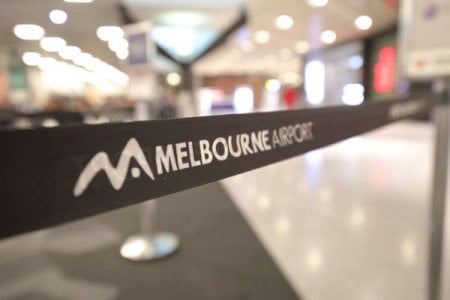Newest measles case at Melbourne Airport sparks another health alert
- Replies 6
Amidst growing concerns surrounding public health, recent reports from Victoria highlight the emergence of measles cases, with particular attention drawn to a confirmed incident at Melbourne Airport.
This development underscores the ongoing challenges faced by health authorities in combatting infectious diseases within densely populated areas and high-traffic transit hubs. Such occurrences require a comprehensive understanding of epidemiological patterns and robust public health responses to mitigate the risk of further transmission.
As health officials navigate this complex landscape, vigilance and proactive measures remain paramount in safeguarding community well-being and preventing the escalation of potential outbreaks.
The recent report of a measles case at Melbourne Airport raised concerns among the public and health officials alike.
The individual in question, a returned overseas traveller, tested positive for measles after transiting through Melbourne Airport's T2 international terminal on Wednesday, between 9:15 pm and 10:30 pm, following their arrival on flight EK408 from Dubai.

Victoria Health issued a warning to those who were on the flight or in the airport during the specified times.
‘If you have been to one of the exposure sites, you must monitor for symptoms for 18 days. Symptoms usually start to appear after a week,’ Victoria’s Chief Health Officer Dr Clare Looker stated.
‘If any symptoms develop, you should seek immediate medical attention.’
‘Please call ahead before arriving at a medical facility, so that they can see you in isolation from other patients,’ she added.
According to Victoria Health, measles is a highly infectious viral disease that can spread rapidly among unvaccinated populations.
It often starts with symptoms similar to a common cold, followed by a fever and a distinctive rash.
Young children and immunocompromised adults are particularly vulnerable to serious complications if they contract measles.
In Australia, measles is relatively rare, largely thanks to the country's high vaccination rates; however, recent cases have been linked to unvaccinated individuals or those returning from overseas, where measles may be more prevalent.
This incident at Melbourne Airport served as a reminder of the disease's persistent threat in a globalised world.
Dr Looker also took this opportunity to stress the importance of vaccinations for those planning to travel abroad.
‘Anyone planning overseas travel should ensure they have received appropriate vaccinations, including an MMR vaccine if they don't have a history of two previous MMR (measles, mumps, and rubella) vaccinations,’ she urged.
The situation at Melbourne Airport is a wake-up call for all of us, especially for our community of over 60 who may have grandchildren travelling or may be considering overseas trips themselves.
It is crucial to stay informed about vaccination requirements and health advisories for your destination. Moreover, maintaining up-to-date immunisations is not just for personal protection; it's a public health responsibility.
As health authorities remain vigilant in addressing the recent measles cases reported at Melbourne Airport, a parallel alert issued by officials further underscores the urgency of the situation.
With a measles case detected within the airport environment, concerns heighten regarding the potential for widespread transmission and the imperative of swift and coordinated responses to contain the outbreak.
These interconnected developments highlight the critical importance of proactive measures and public awareness campaigns to mitigate the risk of further infections, especially within vulnerable populations such as seniors.
 Have you checked your vaccination status lately? Are you planning any international travel in the near future? Share your thoughts and experiences with us in the comments below.
Have you checked your vaccination status lately? Are you planning any international travel in the near future? Share your thoughts and experiences with us in the comments below.
This development underscores the ongoing challenges faced by health authorities in combatting infectious diseases within densely populated areas and high-traffic transit hubs. Such occurrences require a comprehensive understanding of epidemiological patterns and robust public health responses to mitigate the risk of further transmission.
As health officials navigate this complex landscape, vigilance and proactive measures remain paramount in safeguarding community well-being and preventing the escalation of potential outbreaks.
The recent report of a measles case at Melbourne Airport raised concerns among the public and health officials alike.
The individual in question, a returned overseas traveller, tested positive for measles after transiting through Melbourne Airport's T2 international terminal on Wednesday, between 9:15 pm and 10:30 pm, following their arrival on flight EK408 from Dubai.

Victoria Health issued a health warning after a traveller returning from overseas tested positive for measles following transit through Melbourne Airport. Credits: Shutterstock
Victoria Health issued a warning to those who were on the flight or in the airport during the specified times.
‘If you have been to one of the exposure sites, you must monitor for symptoms for 18 days. Symptoms usually start to appear after a week,’ Victoria’s Chief Health Officer Dr Clare Looker stated.
‘If any symptoms develop, you should seek immediate medical attention.’
‘Please call ahead before arriving at a medical facility, so that they can see you in isolation from other patients,’ she added.
According to Victoria Health, measles is a highly infectious viral disease that can spread rapidly among unvaccinated populations.
It often starts with symptoms similar to a common cold, followed by a fever and a distinctive rash.
Young children and immunocompromised adults are particularly vulnerable to serious complications if they contract measles.
In Australia, measles is relatively rare, largely thanks to the country's high vaccination rates; however, recent cases have been linked to unvaccinated individuals or those returning from overseas, where measles may be more prevalent.
This incident at Melbourne Airport served as a reminder of the disease's persistent threat in a globalised world.
Dr Looker also took this opportunity to stress the importance of vaccinations for those planning to travel abroad.
‘Anyone planning overseas travel should ensure they have received appropriate vaccinations, including an MMR vaccine if they don't have a history of two previous MMR (measles, mumps, and rubella) vaccinations,’ she urged.
The situation at Melbourne Airport is a wake-up call for all of us, especially for our community of over 60 who may have grandchildren travelling or may be considering overseas trips themselves.
It is crucial to stay informed about vaccination requirements and health advisories for your destination. Moreover, maintaining up-to-date immunisations is not just for personal protection; it's a public health responsibility.
As health authorities remain vigilant in addressing the recent measles cases reported at Melbourne Airport, a parallel alert issued by officials further underscores the urgency of the situation.
With a measles case detected within the airport environment, concerns heighten regarding the potential for widespread transmission and the imperative of swift and coordinated responses to contain the outbreak.
These interconnected developments highlight the critical importance of proactive measures and public awareness campaigns to mitigate the risk of further infections, especially within vulnerable populations such as seniors.
Key Takeaways
- A returned overseas traveller tested positive for measles after transiting through Melbourne Airport's T2 international terminal.
- Victoria Health advised people who were on the flight or at the airport during the specified times to monitor for measles symptoms for 18 days.
- Measles is a highly infectious viral disease, especially in unvaccinated individuals and those at high risk such as young children and immunocompromised adults.
- Dr Clare Looker emphasised the importance of appropriate vaccinations, including the MMR vaccine, for anyone planning overseas travel.







